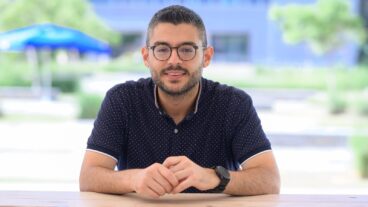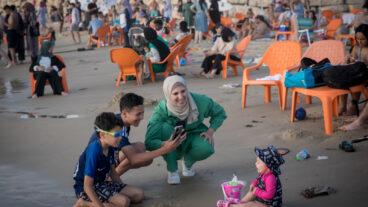Dr. Amal Khoury: At Hadassah no one notices or cares what you are. The staff are like one large family.If you ever got mangled in a car crash, you’d want someone like Amal Khoury to put you back together again.
Khoury has already mended hundreds of people who have passed through Hadassah Medical Center in Jerusalem where he is one of the country’s top orthopedic trauma surgeons.
Over the last two years, Khoury has been further honing his skills through a fellowship that brought him to Toronto’s Sunnybrook Hospital, Canada’s largest trauma center, as well as New York’s Hospital for Special Surgery, where he is currently visiting.
“There are at least 50 orthopedists [at Hadassah] who can mend a broken bone, but only three or four whom I call ‘elite commandos’ – doctors who can deal with multiple, critical injuries – and Amal Khoury is one of them,” says Hadassah Orthopedic Trauma Service head Prof. Rami Mosheiff, describing the affable 36-year-old from Nazareth. “What’s more, as cars go faster, and bombs become more powerful, the type of orthopedic injuries we see are much more complex,” says Mosheiff, “making people with Khoury’s expertise even more critical.”
During his stay in Toronto, the Israeli surgeon has given a series of lectures and presentations offering North American colleagues a unique insight into what he calls his “unfortunate area of expertise” – terror injuries.
“Some 70 percent of injuries sustained in terror attacks involve bone damage,” Khoury told ISRAEL21c – meaning that many of the Jerusalem area terror victims of the last few years have ended up under his care, as Hadassah has become a world leader in trauma and mass casualty medicine.
“There is growing awareness that no one is exempt from mass casualty scenarios anymore, so doctors in the US and Canada are also very interested in this field.” notes Khoury.
At Hadassah, a place he calls “an island of sanity,” Khoury has mended people of every stripe – Palestinians, Israelis, and foreign tourists; Jews; Muslims and Christians – many of them, victims of terror attacks.
There is something ironic about this. Khoury, an Israeli Arab who has warm and harmonious relationships with Jews and Arabs alike, finds himself at the vortex of a conflict that he can barely understand.
He was born in Nazareth, one of four boys in a Christian Arab family which includes “quite a few doctors.” After a stint studying engineering at Haifa’s Technion, Khoury switched to medicine at the Hebrew University-Hadassah Medical School “because it was a field that engaged my soul and not just my mind.”
Seated in a café, during a visit home, his cell phone rings frequently, and he switches from Arabic to Hebrew to English effortlessly, perfectly fluent in all three. For Khoury, the communities in Israel are seamless – he floats back and forth from Baka, the hip Jewish neighborhood of Jerusalem where he lives with his architect wife Ranin and their three young children, to his childhood home in Nazareth, the mixed Christian-Muslim city in the Galilee where Jesus grew up.
“My Jewish friends are no different than my Arab friends – I don’t even notice their background. I know I would do everything for them, and they would do everything for me. If it’s this way for me, I sometimes find it hard to understand why it isn’t like this for everyone else.”
“At Hadassah,” continues Khoury, “no one notices or cares what you are. The staff are like one large family.”
As for the patients, Khoury says he may well have operated on a terrorist, and he has certainly mended many terror victims. But he has never given either a second thought.
“We never look at who the patient is. We try to give each person the best possible medical care,” he explains, noting that the hospital’s unwavering commitment to this approach recently led it to be nominated for a Nobel Peace Prize.
Members of Hadassah’s medical staff, like Khoury, are given training to help them deal with the potentially traumatic after-effects of intense exposure to terror attacks and victims.
“Not many people are ready to do what Amal [Khoury] does – working 36-hour shifts, being on call all the time – weekends and holidays, day and night, making life and death calls,” says Moshieff. “There are many orthopedists who train for years, and then enjoy a normal life, working from 10 to 5, doing straight forward wrist operations, and going home to their families.”
So why does Khoury choose this line of work?
“I ask myself the same question,” he laughs.
For one thing, he says he loves the challenge of orthopedic trauma, where no two cases are alike, and where a doctor is often called upon to make critical decisions.
He could probably work anywhere in the world. But Khoury has chosen to come home to Israel this summer, and believes he’ll be returning to a less turbulent situation than the one he left in 2003. “I hope things will be different, and I think they will be.”
He bases that hope on his knowledge of Israelis and Palestinians.
“I still believe in the two peoples living here. I know them both very well and they are good peoples – maybe a little too similar. But I have faith in them.
“I think that ultimately we have the potential and resources to make this one of the best places in the world to live.”
Besides, says Khoury, Israel already offers a certain sense of security that is lacking in Canada and the US.
“If one of my children got lost in a mall in a city in North America, I’d be terrified. But in Israel I wouldn’t even have time to worry because everyone would go out of their way to help a child find his parents – and here, again, it doesn’t matter whether you’re talking about Arabs or Jews. People here care, and people are involved. I like that – it’s one of the things that keeps me here, and keeps me going.”
Being abroad – this was Khoury’s first fellowship at a foreign medical center – has also broadened his perspective on his own hospital.
“Now that I’ve had a chance to visit other leading centers, I see that the Hebrew University-Hadassah Medical School has nothing to be ashamed of – it is one of the top med schools in the world.”
During his fellowship, Khoury concentrated on learning a particular clinical field – pelvic and acetubular surgery – for which Sunnybrook is renowned. He also spent time conducting research in the Toronto hospital’s biomechanics lab – another field that will benefit Hadassah, and visited the orthopedic trauma service at New York-s Hospital for Special Surgery.
But the gain is mutual. Hadassah is considered a leading center in the area of computer-assisted surgery (CAS), and Khoury’s presence at Sunnybrook enabled its staff to lay the foundations for its own CAS program. Computer-assisted surgery is less invasive and more precise than conventional surgery, as well as safer in that it exposes doctor and patient to less x-ray radiation.
The young Israeli surgeon arrived in North America equipped with vast expertise in treating terror injuries. But as he prepares to return to Jerusalem, Khoury’s long-term vision for Hadassah is a much rosier one. “I believe we can build on our know-how in order to become a leading international center for computer-assisted surgery, and offer our expertise to researchers and doctors worldwide.”












